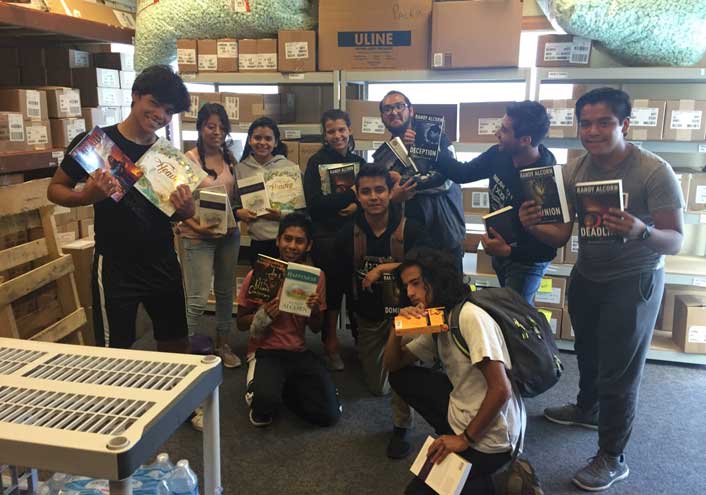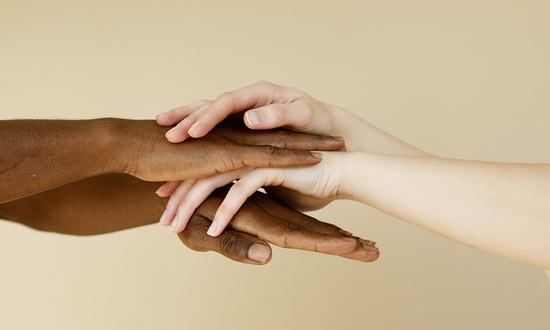Unfortunately, in this world under the Curse, there’s often hostility and division between races and nations. But Christ died for our sins of racism and nationalism (I’m not speaking about patriotism—it’s usually healthy for people to be proud of their countries). The redemption of mankind and the earth will include the redemption of human relationships and the uniting of different people groups in Christ. There are different races in Heaven (Revelation 7:9) and even different nations on the New Earth (Revelation 21:24). But there will be no racial prejudice or belief that one’s nation is inherently superior to others.
Some scholars argue that the image of God has a corporate dimension: Richard Mouw says, “There is no one human individual or group who can fully bear or manifest all that is involved in the image of God, so that there is a sense in which that image is collectively possessed. …By looking at different individuals and groups we get glimpses of different aspects of the full image of God.” [1]
If this is true, and I believe it likely is, then racism is not only an injustice toward people but also an indirect rejection of God’s very nature. On the New Earth we’ll never celebrate sin, but we’ll celebrate diversity in the biblical sense (though never in the twisted sense that celebrates sin in the name of diversity). So let’s get a head start now, by loving and serving people of different cultures and races. This article by EPM staff member Shauna Hernandez is an excellent reminder of why we should do so. Thanks, Shauna, for what you and all our staff bring to the diversity of EPM! —Randy Alcorn
Lately, I’ve noticed it’s trendy, especially for young people, to be cultured, travel internationally, and cross off bucket lists. Now don’t get me wrong. I’ve done my share of seeing other parts of the world, and am an advocate for experiencing culture, food, traditions, and plane rides. But what if as believers, God has a deeper purpose behind our desire to travel and experience other cultures?
What I want us to remember is that God is the one who sets these desires in us. He also might have other lessons for us when we travel—like what we can learn from meeting people from other cultures. When we visit other countries, let’s keep God’s people as our top priority. Instead of overlooking the ones He calls treasured (Deuteronomy 7:6), let’s make them the most important part of discovering new places.
Here are three Biblical reasons why I think we should love people from other cultures and make them an important part of our travel:
1. Christ did it.
I can’t think of a single better reason to care for others than the fact that Jesus did. In John 4 we see Him interact with a Samaritan woman. Jesus asks her for a drink at the well and she responds, “‘How is that you, a Jew, ask for a drink from me, a woman of Samaria?’ (For Jews have no dealings with Samaritans.)” (John 4:9). Jesus, who is fully God and fully human, didn’t have to talk to this woman. He was more than capable of getting water on His own, yet He dismissed the cultural expectations of the time because He cared more for her than that water. In fact, He was (and is) the Living Water that she needed (John 4:10-14). So let’s care more for people than things or adventure, not just because it’s kind, but because Jesus did it.
2. It’s a glimpse of Heaven.
God commands us to set our minds on things above (Colossians 3:2). This doesn’t mean we should only think about Heaven, but it does mean our perspective should ultimately be changed by our eternal dwelling place.
Revelation 7:9-10 says this about Heaven, “After this I looked, and behold, a great multitude that no one could number, from every nation, from all tribes and peoples and languages, standing before the throne and before the Lamb, clothed in white robes, with palm branches in their hands, and crying out with a loud voice, ‘Salvation belongs to our God who sits on the throne, and to the Lamb!’”
When we interact with people from other cultures, we receive a sneak-peak of Heaven. What a gift! Let’s get on board now with what eternity is going to be like. Why would we wait?
3. It’s an abundant way to live.
God created us to experience lives of meaning and depth. In John 10:10 Jesus says, “I came that they may have life and have it abundantly.” When we enter into life with God, we enter into a life that’s incredibly rich. (This is not to be confused with a care-free, easy life. Richness often comes from struggle and relying on the Lord to bring us through the hard times.) One beautiful way we get to experience this abundance is by traveling, visiting other places, and meeting and serving brothers and sisters who worship the same God as us, yet differently.
I experienced another culture recently at our EPM office in Sandy, Oregon. Two years ago I had the opportunity to travel to Morelia, Mexico to visit the NOE center (learn more about this God-honoring organization) with my home church. I’ve been back several times since and have kept ongoing relationships with the students there.
While visiting the U.S., a student group from NOE were passing through Sandy on their way up to Mt. Hood. I suggested they stop by our office and pick out some of Randy’s books to take home. God has given Randy a heart of generosity and because of this, they each took home two books. They were so grateful! (Would you pray with us that these books not only touch these students, but also that God would intimately be known among the people of Morelia, Mexico? Who knows how God could use the Biblical truths found in Randy’s books there.) That experience touched me deeply and showed me that sometimes we don’t even have to travel—God brings people from other cultures right to us.

May we keep our eyes open when we travel, and even here at home, for ways to learn from and minister to people from other cultures. We’ll be all the richer for doing so!
[1] Richard Mouw, When the Kings Come Marching In (Grand Rapids: Eerdmans, 1983), 47.
Photo by nicolas leclercq on Unsplash




